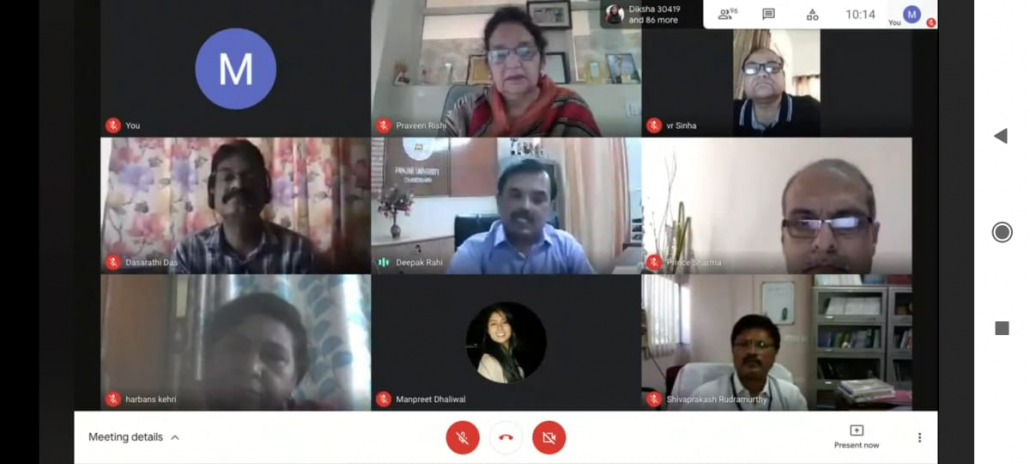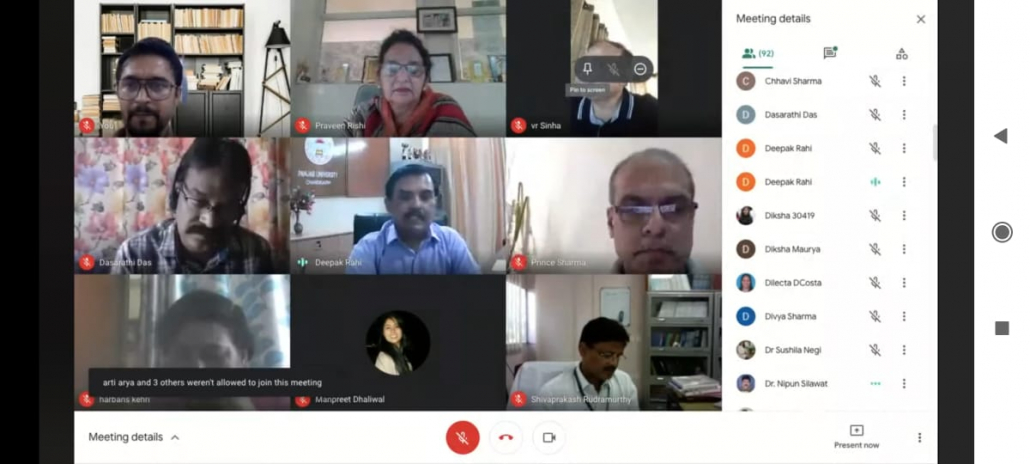Chandigarh May 29, 2021
The Department of Microbiology, Panjab University, Chandigarh organized a national online conference on “COVID-19 associated Mucormycosis (CAM)-Are We Doorstep Away From Next Pandemic: Facts and Myths” today to spread awareness amongst general public about the COVID-19 associated mucormycosis.

The webinar was coordinated by Mr. Khem Raj Thakur, Assistant Professor, Department of Microbiology, PU. Dr. Deepak K. Rahi, Chairman and the organizing secretary of the webinar gave a brief overview of the program and discussed how COVID-19 has become an unsolved puzzle which is getting more and more complex with the advent of mucormycosis. He emphasized that there are many myths and misconceptions about mucormycosis circulating among the general public which need to be addressed and clarified.
Prof. V.R. Sinha, Dean University Instructions gave a brief overview of the post-COVID complications, how they can be treated and emphasized that it is the role of the experts to spread awareness among people and put an end to various myths and misconceptions being spread.
The conference was divided into three technical sessions. In the first technical session, Chaired by Prof. Vijay Prabha, Department of Microbiology, PU a talk on “Mucor and Its Biology” was delivered by Dr. Nipun Silawat, Principal Scientist, M.P. Council of Science and Technology, Bhopal. Dr. Silawat highlighted that mucormycosis is not a new disease but it is a very rare fungal infection which for the first time has been declared as an epidemic. It existed even before the pandemic however the present conditions have favored the proliferation of this organism resulting in infection. He also discussed the predisposing factors such as which are responsible for the outbreak of mucormycosis. He highlighted that Mucormycosis is more lethal than COVID-19 with a lethal rate of 30-50 % and that there is a need to inform people about the present situation. He urged the audience to not become one’s own doctor and to see a specialist immediately if any symptoms appear.
In the second technical session chaired by Prof. Praveen Rishi, Department of Microbiology a talk on “Epidemiology, Diagnosis and Management of Mucormycosis in light of COVID-19 Pandemic” was delivered by Dr. Shivaprakash M. Rudramurthy, Senior Professor, Department of Medical Microbiology, PGIMER. He explained the complications associated with COVID-19 and discussed the epidemiology of COVID associated mucormycosis. Dr. Shivaprakash highlighted that 95-98 percent of the present mucormycosis are caused by the Rhizophus sp. and mainly by Rhizophus arrhizus. He discussed that the sudden increase in the occurrence of CAM, could be possibly due to increased use of steroids, presence of comorbidities and immunosuppression.He discussed in detail about the treatment effective against the mucorales and the preventive measures which should be followed to limit the occurrence of this disease. He emphasized that control on diabetes and controlled use of steroids can to very extent prevent the increased incidences of the infection.
In the third technical sessions Chaired by Prof. Kusum Harjai, Department of Microbiology, a talk on “Host-pathogen interplay in Mucormycosis” was delivered by Dr. Manpreet Dhaliwal, DHR Women Scientist, Advanced Pediatrics Center, PGIMER. She discussed how closely mucormycosis is related to diabetes in India and how invasive mucormycosis is a life-threatening, angioinvasive infection which can result into death unless prompt therapy is constituted. She also discussed the pathogenic strategy of Mucorales with special emphasis on fungal recognition by the host immune system and comment on the long-standing association of increased mucormycosis incidence in uncontrolled diabetics.
The three technical sessions were followed by concluding remarks by Dr. Deepak K. Rahi, Chairman and Organizing secretary who highlighted all the major points regarding mucormucosis from the delivered talks. The conference ended with a vote of thanks which was delivered by Dr. Seema Kumari, Assistant Professor, Department of Microbiology, Panjab University.




